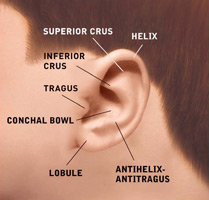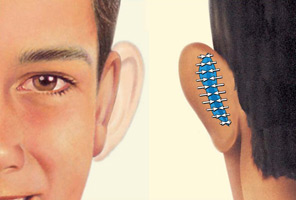The Procedure
Step 1 - Anesthesia
Medications are administered for your comfort during the surgical procedure. The choices include local anesthesia combined with intravenous sedation or general anesthesia. Your doctor will recommend the best choice for you.
Step 2 - The incision
Correction of protruding ears uses surgical techniques to create or improve the antihelical fold (just inside the rim of the ear) and to reduce enlarged conchal cartilage (the largest and deepest concavity of the external ear). Incisions for otoplasty are generally made on the back surface of the ear. When incisions are necessary on the front of the ear, they are made within its folds to hide them. Internal, non-removable sutures are used to create and secure the newly shaped cartilage in place.


Step 3 - Closing the incisions
External stitches close the incision. Techniques are individualized, taking care not to distort other structures and to avoid an unnatural "pinned back" appearance.

Step 4 - See the results
Ear surgery offers near immediate results in cases of protruding ears, visible once the dressings are removed. With the ear permanently positioned closer to the head, surgical scars are either hidden behind the ear or well-hidden in the natural creases of the ear.

